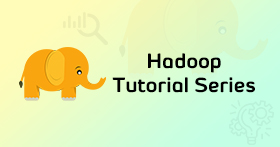Big Data Tutorial – Learn Big Data from Scratch and Become a Pro
Are you ready to embark on a journey to unlock the secrets of Big Data? Our Big Data tutorial is the perfect starting point for anyone looking to master the art of big data analysis. Imagine being able to process, analyze and visualize vast amounts of data with ease. Imagine being able to turn data into actionable insights that drive business success. With our comprehensive tutorial, you’ll learn how to do just that.
What is Big Data?
Big Data is the data which cannot be managed by using traditional databases. Here is Gartner’s definition: The Data sets with huge volume, generated in different varieties with high velocity is termed as Big Data. These are considered as 3 Vs of Big Data.
These humongous volumes of data can be used to generate advanced patterns & address business problems you wouldn’t have been able to handle earlier.

Start Learning Big Data
Explore these Big Data tutorials and master the different technologies of Big Data. Choose where to begin, learn at your own pace:
Beginner
- What is Big Data?
- Big Data History and Use Cases
- Benefits of Big Data
- Why Learn Big Data?
- Top Big Data Tools
- Why Big Data is popular?
- Rise of Big Data
- Big Data Career Path
- Why choose a Career in Big Data?
- Careers and Job Roles in Big Data
- Big Data Job Roles
- Switch your career to Big Data
- Big Data Developer Skills
- Big Data Use Cases – Hadoop, Spark and Flink
- Apache Flink – A Big Data Platform
- Big Data for Union Budget
Big Data Applications
- Big Data Applications
- Big Data Applications in Various Domains
- Big Data is Helping in Wildlife Conservation
- Big Data in Agriculture
- Big Data in Education Sector
- Big Data in Education
- Big Data in Travel Industry
- Big Data in Telecom Industry
- Big Data in Healthcare
- Big Data in Retail Industry Real World uses
- Big Data in retail industry?
- Big Data in Income Tax
- Big Data at Flipkart
- Big Data in Banking Sector
- Big Data in Banking
- Big Data in Media and Entertainment
- Big Data in Automobile Industry

Hadoop Concepts
- Hadoop Tutorial
- History of Hadoop
- What is New in Hadoop 3?
- Features Of Hadoop
- Hadoop Ecosystem
- Hadoop Architecture
- Advantages and Disadvantages
- Hadoop Analytics Tools
- How Hadoop Works Internally
- Hadoop Commands
- Hadoop getmerge Command
- Hadoop copyFromLocal Command
- Hadoop High Availability
- Hadoop Schedulers
- Distributed Cache in Hadoop
- Hadoop automatically Failover
- Limitations of Hadoop
- HBase Compaction
- Hadoop 2.6 Multi Node Cluster
- Spark Hadoop Cloudera Certifications
- Hadoop Career Growth
- Future of Hadoop
- Hadoop Job Roles
- Hadoop Developer Salary
- Hadoop Books
- Best Hadoop Books
- Best Hadoop Administration Books
Hadoop Installation
- Install Hadoop on Single Machine
- Install Hadoop on Ubuntu
- Install Hadoop on Centos
- Install Pivotal Hadoop v-2 Cluster in production
- Install Hadoop 1.x on multi-node cluster
- Install Hadoop 2 on Ubuntu
- Install Hadoop 2 on Ubuntu 16.0.4
- Install Hadoop 2 with YARN
- Install YARN with Hadoop 2
- Install Hadoop 2.7 on Ubuntu
- Install Hadoop 3 on Ubuntu
Hadoop Advanced Concepts
- Hadoop Ecosystem Infographic
- Hadoop Ecosystem
- Introduction to Hadoop Security
- Hadoop MapReduce Tutorial
- Kafka Hadoop Integration
- Big Data Use Cases – Case Studies
- What is Hadoop Cluster?
- Hadoop Cluster
- Hadoop Streaming
- Hadoop Mapper in MapReduce
- Big Data Terminologies
- Hadoop Applications
- Hadoop and Data Warehouse
- Why Hadoop is Important?
- Big Data and Hadoop Job Opportunities
- Setup Hadoop CDH3 on Ubuntu
Apache Spark Concepts
- Spark Tutorial
- Introduction to Apache Spark
- What is Apache Spark
- What is Spark
- Install Spark On Ubuntu
- Spark Installation in Standalone Mode
- Install Apache Spark on Multi-Node Cluster
- Apache Spark Terminologies
- Apache Spark Ecosystem
- How Apache Spark Works
- Reasons To Learn Apache Spark
- Features of Apache Spark
- Spark Shell Commands
- SparkContext
- Spark Notes
- Apache Spark and Scala Books
- Apache Spark Careers and Job Opportunities
Intermediate
- Spark In-Memory Computing
- Lazy Evaluation in Apache Spark
- Fault tolerance in Apache Spark
- DAG in Apache Spark
- Apache Spark Cluster Managers
- Apache Spark Compatibility with Hadoop
- Spark Performance Tuning
- Apache Spark Executor
- Spark Stage
- Limitations of Apache Spark
- Data Type Mapping Between R and Spark
- Apache Mesos Tutorial
- Apache Mesos Books
- Spark Dataset Tutorial
- Apache Spark Use Cases
- Big Data Use Cases – Hadoop, Spark and Flink Case Studies
- Apache Spark Certifications
Advanced Concepts
- Spark Streaming Tutorial
- Apache Spark DStream (Discretized Streams)
- Apache Spark Streaming Transformation Operations
- Spark Streaming Checkpoint
- GraphX API in Apache Spark
- Spark GraphX Features
- Spark Machine Learning with R
- Apache Spark MLlib Algorithms
- Spark MLlib Data Types
- Apache Spark Machine Learning Algorithm
Spark Project
Exploring the Big Data world
Big Data, Big Opportunities: Master Big Data and Take Your Career to the Next Level with our FREE tutorials, practicals, case studies, interview questions and real-time projects!
History of Big Data
Roger Magoulas, in 2005, coined the term ‘Big Data’. In the same year, the development of Hadoop started. It is an open-source framework that could process both structured and unstructured data. This was built on top of Google’s MapReduce and crafted by Yahoo!. Today, the term Big Data pertains to the study and applications of data sets too complex for traditional data processing software to handle. This concept faces challenges in capturing data, data storage, data analysis, search, sharing, transfer, visualization, querying, updating, information privacy, and data source.

Roger Magoulas
How to Become a Big Data Developer?
- Understand the concept of big data and its importance in today’s world
- Learn the basics of big data technologies and platforms such as Hadoop and Spark
- Understand the different types of big data processing and analysis techniques, such as batch processing, real-time processing and machine learning
- Learn how to use big data visualization tools to communicate insights to stakeholders
- Learn how to handle and analyze large, complex and unstructured data sets
- Understand the importance of data ethics and how to handle sensitive information properly
- Stay updated with the latest developments and trends in the field of big data, such as deep learning and artificial intelligence
- Learn from experts in the big data field and gain hands-on experience working with real-world data sets.
- Practice working with different types of big data, such as structured and unstructured data, and different file formats such as CSV, JSON, and SQL databases
- Learn how to use big data processing and analysis tools such as Pig, Hive, and Impala
- Understand the concepts of distributed computing and how to use it to process big data
- Learn about the different storage options for big data, such as HDFS and NoSQL databases
- Understand the concept of data lakes and how to create and manage them
- Learn how to use big data streaming technologies such as Apache Kafka
- Learn about data governance and data management best practices for big data
Why Should I Learn Big Data?
- High demand for big data professionals: As more companies collect and store large amounts of data, the demand for professionals with skills in big data technologies is increasing.
- High earning potential: Professionals with big data skills often command high salaries, as they are in high demand and can help companies make better use of their data.
- Opportunities for career advancement: Learning about big data can open up new career opportunities, such as data scientist, data analyst, and big data engineer, which often come with higher pay and more responsibility.
- Better decision-making: Understanding big data can help organizations make better use of their data to make more informed decisions, which can lead to improved performance and competitiveness.
- Better ability to understand the world around you: Understanding big data can give you a deeper understanding of the world around you and the ability to make sense of the vast amount of information that is available.
- Better ability to make a difference: With the knowledge of big data, you can work in fields like healthcare, education, finance, transportation, and government to make a real difference in people’s lives.





